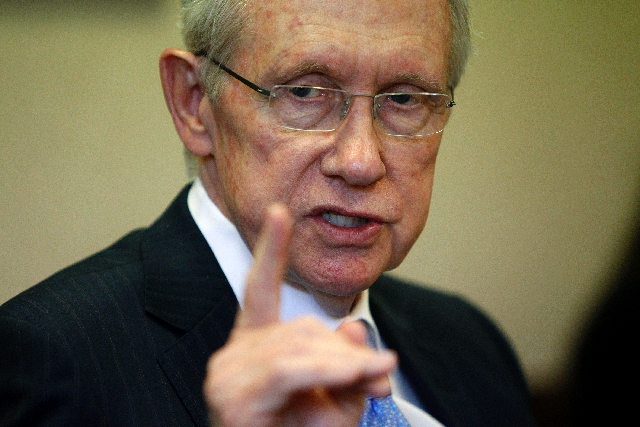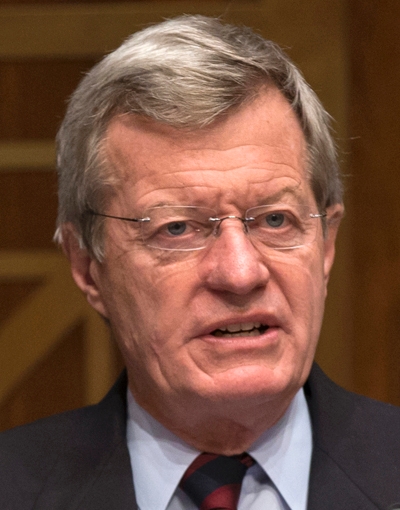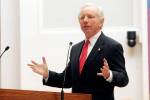Health care overhaul, will government be ready?
WASHINGTON — Insurance enrollments mandated by the massive health care overhaul are scheduled to start in five months but there are growing doubts on Capitol Hill that the government will be ready.
“We will be up and operational. I don’t have any question about that,” said Gary Cohen, director of the Center for Consumer Information and Insurance Oversight, part of the Obama administration.
However, lawmakers are expressing worry. Some are saying they are not surprised that the historic makeover of the health insurance system might get off to a rough start.
A Henry J. Kaiser Family Foundation poll conducted this month found that 56 percent of the uninsured say they have too little information to know how Obamacare will affect them.
In Nevada, an estimated 554,000 uninsured adults could benefit from the program.
Sen. Max Baucus, D-Mont., who helped craft the law, believes the Obama administration is failing to educate the public about the state exchanges — and time is running out.
“I just see a huge train wreck,” Baucus said during a Senate Finance Committee hearing last month.
Senate Majority Leader Harry Reid, D-Nev., echoed that sentiment on Friday in a meeting with Las Vegas Review-Journal staff.
“Max was talking about the fact we have to make sure it is implemented properly, and if not it would be a train wreck, and that’s true,” Reid said. “And that’s been something that is somewhat difficult.”
Blaming Republicans for cutting funds to implement the health care law, Reid said the Obama administration now is shifting money into outreach and education from wellness programs authorized by the law.
REPUBLICANS SEE OPPORTUNITY
For Democrats, the fear is that the open enrollment season does not run smoothly, leaving consumers with an indelibly bad impression of Obamacare, and Republicans with the upper hand in the 2014 midterm elections.
Republicans, who advocate repeal of the Affordable Care Act, have seized on the “train wreck” comment as an indictment of the entire program as a costly mistake.
“The alarm bells over how Obamacare will unfold are getting louder by the day,” said Rep. Fred Upton, R-Mich., who chairs the House Energy and Commerce Committee.
Republican campaign committees have targeted vulnerable Democrats in news releases and social media to link them to any seed of doubt about Obamacare.
President Barack Obama last week sought to downplay expectations for a smooth launch of the health insurance marketplaces, telling reporters at the White House that there are bound to be “glitches and bumps.”
“Even if we do everything perfectly, there will still be glitches and bumps, and there will be stories that can be written that say, ‘Oh look, this thing is not working the way it’s supposed to,’ ” Obama said. “And that’s pretty much true of every government program that’s ever been set up.”
HEALTH INSURANCE EXCHANGES
The health insurance exchanges — a centerpiece of the 3-year-old health law — are scheduled to come on line on Oct. 1 to provide consumers with a one-stop, online shop to compare and purchase private insurance plans and determine if they are eligible for subsidized rates or Medicaid. The insurance coverage would start Jan. 1.
Consumers can navigate through the application process on their own. But the law also provides for exchanges to have “navigators” to assist them.
The Department of Health and Human Services plans to spend $332 million for education and outreach in states where the federal government will operate exchanges. The agency also announced $54 million in grants are available in these states to provide “navigators” to assist enrollees through the process.
“We are focusing on education and outreach to make sure eligible individuals understand what benefits they are entitled to receive and how to enroll,” HHS Secretary Kathleen Sebelius said.
While the Kaiser poll shows much work remains to be done, there is a ray of hope that public awareness is growing as the exchanges get ready for business. The number of uninsured who say they don’t have enough information about Obamacare has dropped from 67 percent in March to 56 percent in April.
A key responsibility for navigators will be to do outreach into communities identified as having high proportions of uninsured. States can also have in-person “assisters” to walk people through the enrollment process — helping consumers determine if they qualify for subsidies and which of the available insurance options best fit their needs.
QUESTIONS ABOUT EXCHANGES
At congressional hearings, Sebelius and Cohen have faced repeated questions over the exchanges, and in particular the administration’s effort at public education and outreach.
Republicans have hammered away at the potential cost of the navigator program and whether it has been designed to benefit Obama’s political backers.
Rep. Tim Murphy, R-Pa., questions why HHS is turning to community groups instead of insurance brokers to help guide people through the enrollment process.
“I hope we are not simply paying groups to pad their membership roles or funding drives,” Murphy said.
Insurance brokers and agents are prohibited from being navigators because of conflict of interest. However, they can continue to offer their services to any insurance consumers including those who use the exchanges, according to HHS.
Rep. Diane Black, R-Tenn., questioned Sebelius about the overall cost of navigators given that California intends to hire 21,000 individuals who could be paid up to $48 an hour to help enroll the state’s estimated 5.3 million uninsured.
“That would cost taxpayers more than $1.5 billion in California alone?” she asked at a recent hearing.
Rep. Henry Waxman, D-Calif., noted he has sat through five hearings this year on the Affordable Care Act where Republican lawmakers have waged a campaign to undercut the law that they oppose.
“They call these oversight hearings and predict all these terrible things to happen but they aren’t really predicting — they are wishing bad things to happen,” Waxman said.
California actually expects to spend far less on its in-person assisters program, paying $58 per successful enrollment through the “Covered California” exchange. The state exchange expects that 700,000 people will be helped through the application process, and has set aside about $40 million in federal funds to pay the tab.
STATE-BASED EXCHANGES
California is one of 17 states including Nevada that are operating exchanges independent of the federal government. Seven states have partnered with the federal government on their exchanges. And 26 states have left it to the federal government to operate their exchanges.
Many uninsured people will come to the state-based exchanges with little experience in selecting health plans, according to Pam Silberman, president of the North Carolina Institute of Medicine. A recent survey in her state found that 40 percent of the uninsured have been without coverage for five or more years.
Those people are likely to need help making decisions about deductibles, co-payments and other trade-offs between available insurance plans, Silberman said.
“There is a huge amount of work and not a lot of funding to support it,” Silberman said. “I think we will need to rely on some volunteer efforts.”
Starting in June, the federal government’s Healthcare.gov website will provide basic consumer information to help them prepare for open enrollment that begins Oct. 1. They will also be running a call center to answer questions, Cohen said.
The online application process will be used to determine if a person is eligible for tax credits to help with the insurance premiums or if they are low-income and qualify for Medicaid. Navigators and in-person assisters will be trained and certified to provide accurate and impartial information to those seeking assistance, he said.
NEVADA’S SPENDING PLANS
Nevada plans to spend about $2.2 million on navigators and enrollment assisters through the 2014 fiscal year. The state has received 41 grant applications for navigators and will select the winners in early May, according to C.J. Bowden, a spokesman for the Silver State Health Insurance Exchange.
Navigators in the state will be responsible for going into the community to promote the exchange to various groups while the enrollment assisters will help people through the application process. Nevada also plans to certify volunteer “application counselors” at hospitals for uninsured individuals who show up in their emergency rooms.
The exchange has set a goal of enrolling 118,000 people during the first year. Officials expect that about 40 percent will turn to navigators or enrollment assisters for help, Bowden said.
The state is also using social media to spread the word about its exchange, providing information through a Facebook page and Twitter account.
Funding for navigators will be decidedly lower in the 33 states where the federal government is playing a role. Health and Human Services last month announced that it has $54 million available and is distributing the funds based on the size of each state’s uninsured population.
“We are preparing to make available in-person or telephone assistance to anyone who may need it,” Cohen said. “The goal is to have these navigators out in the community who will be local, community-based organizations that will be able to reach into the communities.”
Contact Stephens Washington Bureau reporter Peter Urban at purban@stephensmedia.com or 202-783-1760.





























